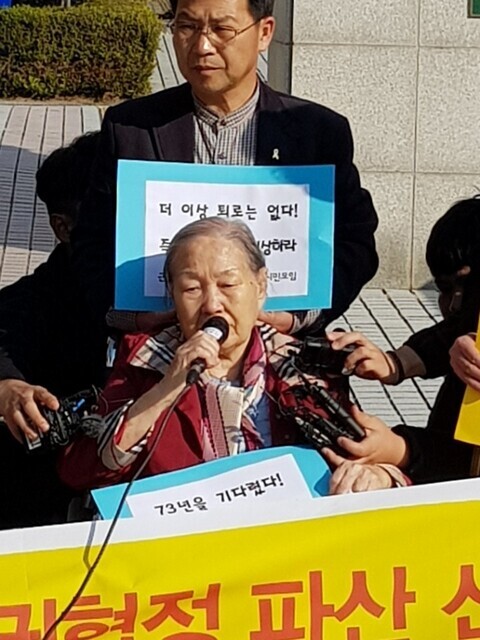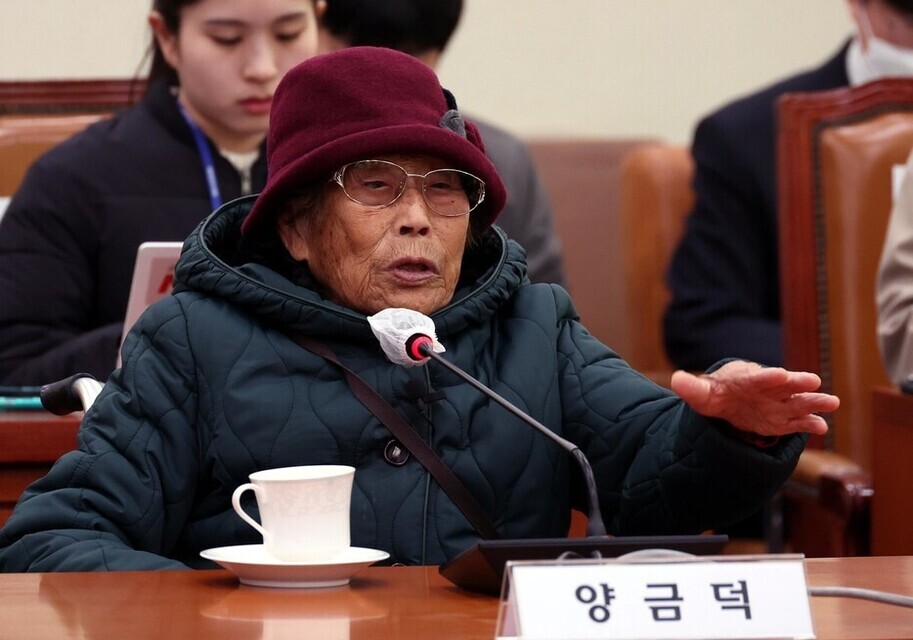hankyoreh
Links to other country sites 다른 나라 사이트 링크
Korean forced laborers seek to seize Mitsubishi’s local assets for reparations for a second time

A group of Korean victims of forced labor during the Japanese colonial era and their families has initiated legal proceedings to liquidate Mitsubishi Heavy Industries’ domestic assets to secure payment for their compensation claims.
This is the second time that victims and related parties have filed for assets to be seized, the first suit having been filed by Yang Geum-deok and others.
On Sunday, the Citizens Association on Imperial Japan’s Labor Mobilization announced that four victims and bereaved families of victims of forced labor applied for a seizure order on Mitsubishi Heavy Industries’ patent rights in Korea through their legal representatives to the Daejeon District Court on Friday. If the seizure order is granted, the group plans to apply for a special monetization order, which would force the sale of the patent rights for liquidation.
The creditors are Yang Yeong-soo and Kim Jae-rim, and the bereaved family members of the late Oh Gil-ae and Choi Jeong-ye. The four filed a lawsuit for solatium after being forced to perform unpaid labor for Mitsubishi Heavy Industries and won in the first and second trials.
The seizure target is one patent of Mitsubishi Heavy Industries for each plaintiff. The amount of compensation demanded is 100 to 150 million won per plaintiff awarded in the second trial of the damages and solatium claim, plus prejudgment interest, for a total of around 680 million won (US$522,500).
“Since the first and second trial rulings on the case requesting damages, the matter was received by the Supreme Court in December 2018 and January 2019, but no final ruling has been made,” explained Kim Jeong-hee, one of the attorneys representing the plaintiffs.
“The first trial already ruled that there could be provisional execution for Mitsubishi Heavy Industries’ assets in Korea, so the legal right exists,” he added.
This is the second application to date for compulsory execution procedures to obtain compensation funds by confiscating and selling off Mitsubishi Heavy Industries’ assets as a company implicated in war crimes.

Previously, attorneys representing some of those drafted into the Korean Women’s Volunteer Labour Corps were able to seize eight of the company’s properties in Korea, including two trademark rights and six patent rights. Two of the plaintiffs — Yang Geum-deok and Kim Seong-ju — received a Supreme Court decision in September 2021 upholding the confiscation of liabilities and ordering their disposal.
But Mitsubishi Heavy Industries refused to comply, and after one of its appeals was dismissed, it filed another with the Supreme Court, where the case is currently underway.
During this process, the South Korean Ministry of Foreign Affairs sent an opinion to the Supreme Court on July 26 of last year asking for “time to reach a diplomatic solution.” While the case was being postponed, the “third-party compensation” plan was presented, with a South Korean foundation paying compensation to forced labor mobilization survivors instead of the Japanese companies responsible.
If the court decides to reopen the case and immediately seize Mitsubishi Heavy Industries’ patent rights, the conflict surrounding the “solution” on the forced labor mobilization issue appears likely to enter a new phase.
Lee Guk-eon, chairperson of the Citizens Association on Imperial Japan’s Labor Mobilization, explained that the plaintiffs were “exercising their rights because they do not agree with the government’s third-party compensation plan and they want to receive compensation directly from Mitsubishi Heavy Industries.”
By Jung Dae-ha, Gwangju correspondent; Choi Ye-rin, staff reporter
Please direct questions or comments to [english@hani.co.kr]

Editorial・opinion
![[Guest essay] Preventing Korean Peninsula from becoming front line of new cold war [Guest essay] Preventing Korean Peninsula from becoming front line of new cold war](https://flexible.img.hani.co.kr/flexible/normal/500/300/imgdb/original/2024/0507/7217150679227807.jpg) [Guest essay] Preventing Korean Peninsula from becoming front line of new cold war
[Guest essay] Preventing Korean Peninsula from becoming front line of new cold war![[Column] The state is back — but is it in business? [Column] The state is back — but is it in business?](https://flexible.img.hani.co.kr/flexible/normal/500/300/imgdb/original/2024/0506/8217149564092725.jpg) [Column] The state is back — but is it in business?
[Column] The state is back — but is it in business?- [Column] Life on our Trisolaris
- [Editorial] Penalties for airing allegations against Korea’s first lady endanger free press
- [Editorial] Yoon must halt procurement of SM-3 interceptor missiles
- [Guest essay] Maybe Korea’s rapid population decline is an opportunity, not a crisis
- [Column] Can Yoon steer diplomacy with Russia, China back on track?
- [Column] Season 2 of special prosecutor probe may be coming to Korea soon
- [Column] Park Geun-hye déjà vu in Yoon Suk-yeol
- [Editorial] New weight of N. Korea’s nuclear threats makes dialogue all the more urgent
Most viewed articles
- 1Behind-the-times gender change regulations leave trans Koreans in the lurch
- 2Yoon’s revival of civil affairs senior secretary criticized as shield against judicial scrutiny
- 3South Korean ambassador attends Putin’s inauguration as US and others boycott
- 4Family that exposed military cover-up of loved one’s death reflect on Marine’s death
- 5Hybe-Ador dispute shines light on pervasive issues behind K-pop’s tidy facade
- 6[Guest essay] Preventing Korean Peninsula from becoming front line of new cold war
- 7[Editorial] New weight of N. Korea’s nuclear threats makes dialogue all the more urgent
- 8‘Weddingflation’ breaks the bank for Korean couples-to-be
- 9Yoon’s broken-compass diplomacy is steering Korea into serving US, Japanese interests
- 10U.S. band that performed in N. Korea looking forward to going back